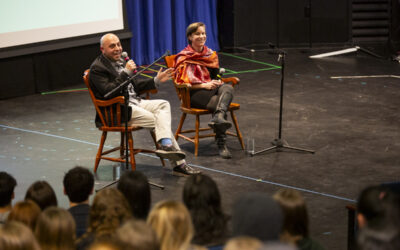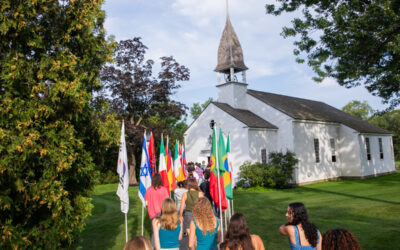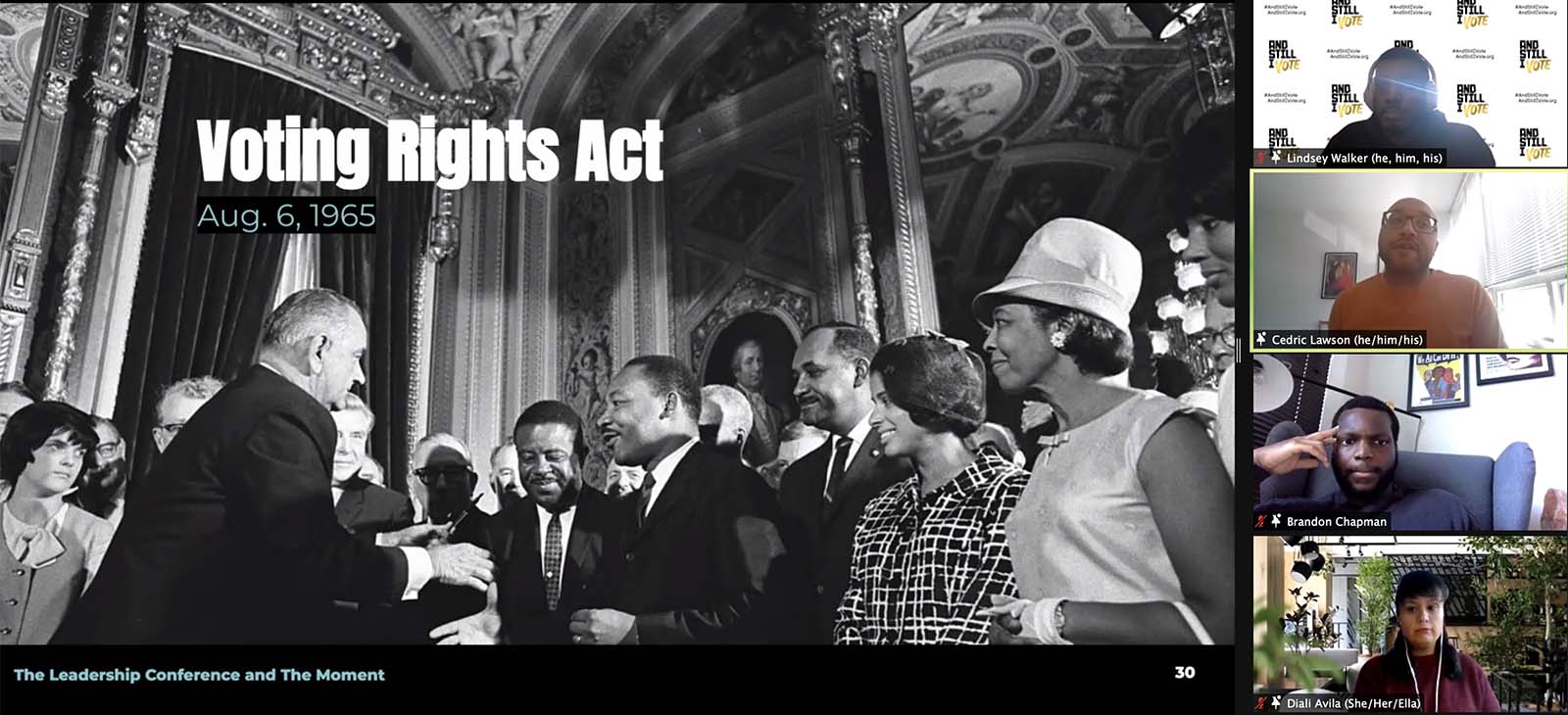
On February 24, Concord Academy welcomed representatives from the Leadership Conference on Civil and Human Rights to speak with students about their work advocating and organizing for democracy, justice, inclusion, and opportunity for all people in the United States. The event took place thanks to the coordinated efforts of 9th grade class student leaders, who modeled coalition building in initiating this all-school assembly, coordinating with affinity groups and the Community and Equity Office to create and host this opportunity for school-wide learning and reflection.
The Leadership Conference on Civil and Human Rights is a coalition of more than 200 national organizations that promote and protect the civil and human rights of all persons in the United States through public education and administrative and legislative advocacy. Founded in 1950, the Leadership Conference has coordinated national legislative advocacy on behalf of every major civil rights law passed since 1957 and helped to organize one of the defining events of the 20th century, the March on Washington for Jobs and Freedom in 1963. Located in Washington, the Leadership Conference represents persons of color, women, children, conservationists, organized labor, persons with disabilities, the elderly, LGTQ+ individuals, and major religious groups. The Leadership Conference’s goal, said Field Director Cedric Lawson, is “a more open and just society — an America as good as its ideals.”
“Civil rights are conferred on you by your government,” Lawson said. “Human rights are what you’re born with. We want to make sure people are able to take part in those civil and human rights, to live up to their potential.” The presentation by him and three other representatives from the Leadership Conference provided a broad overview of the civil and human rights movement’s history and successes and how today’s most pressing issues are being addressed by national organizations, the new Congress, and the new presidential administration. The discussion focused particularly on justice reform, immigration, and voting rights.
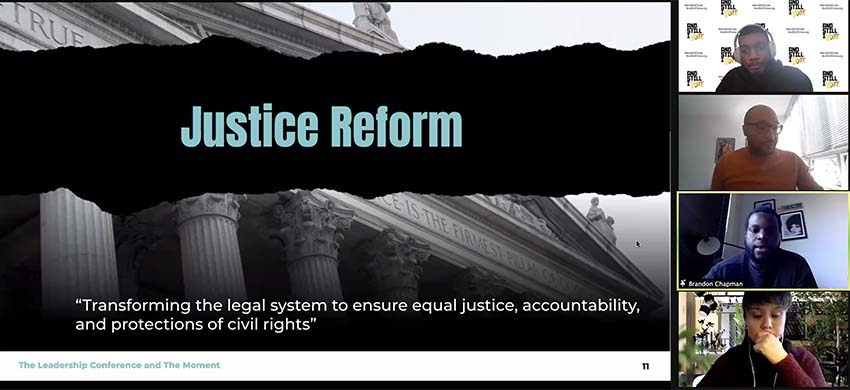
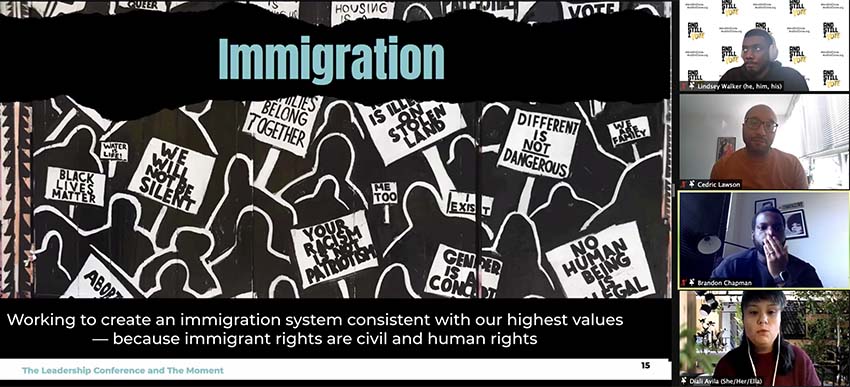
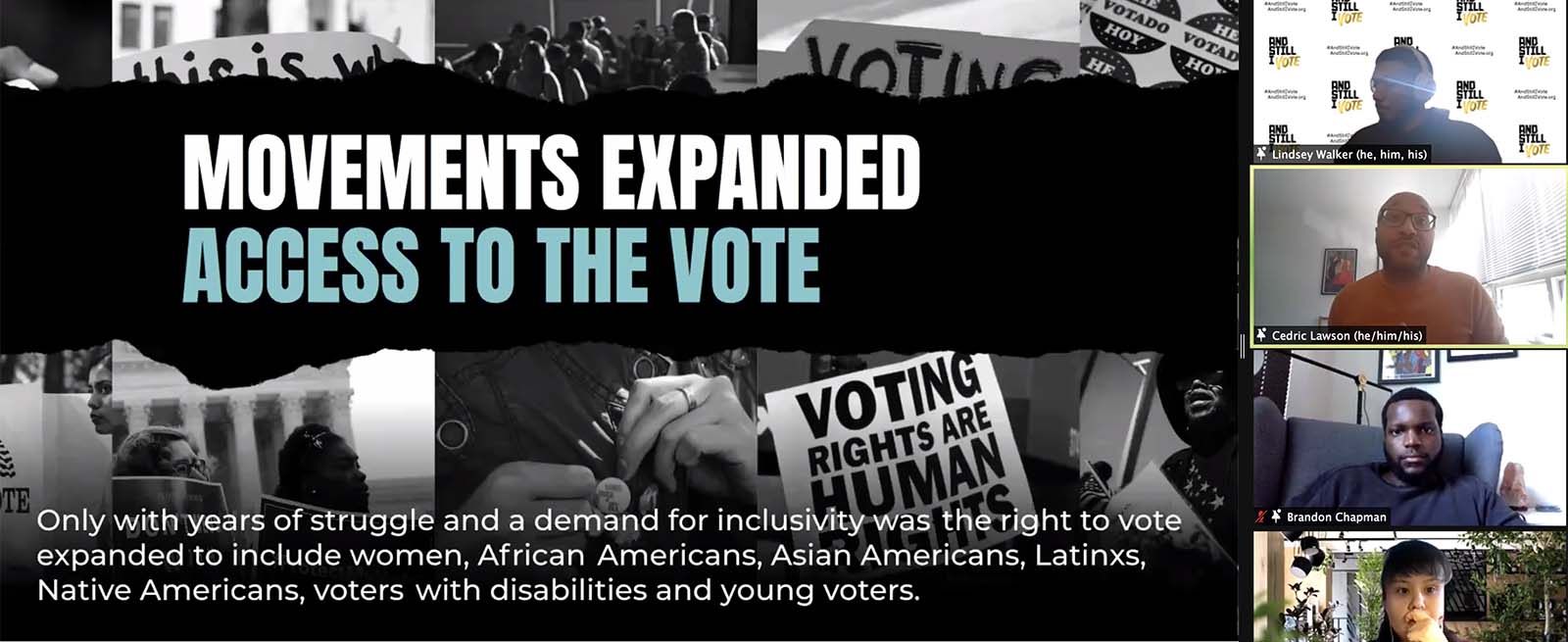
As Brandon Chapman, regional field manager for justice reform, presented, the United States leads the world in imprisoning or supervising more than 6.6 million people, and one in 28 children have an incarcerated parent. Nearly half a million people are in jail not because they have been convicted of a crime but because they cannot afford bail, and the U.S. spends $38 million per day to detail people awaiting trial. Investments in community services and infrastructure pale in comparison.
Chapman, who comes from Charleston, S.C., spoke about his journey into organizing, having heard his grandmother’s stories of growing up in the Jim Crow South and marching with Martin Luther King Jr. When nine people, all African Americans, were murdered in Charleston’s Emanuel African Methodist Episcopal Church in 2015 by a white supremacist gunman, the event hit Chapman personally; he saw others treating this hate crime as an anomaly rather than, he said, “recognizing that laws and policies in Charleston were creating second-class citizenship for residents who weren’t white.” At the Leadership Conference, Chapman coordinates with partners at the state and local levels to advocate for redirecting funding for the criminal legal system to education, after-school programs, housing, and other types of community support. The Leadership Conference’s Vision for Justice campaign aims to ensure accountability in the criminal legal system, build a system of restorative justice, and use public funds to rebuild communities, coordinating support for federal legislation with coalition partners, and aiding states and local groups in holding elected officials accountable.
Senior Field Manager Diwali Avila spoke about her family’s migration to the United States when she was in sixth grade and her experience seeing friends in Arizona deported or unable to enroll in college because of their immigration status and families living daily in fear. She started organizing in 2007 on behalf of the DREAM Act, introduced in 2001 to provide a pathway to citizenship for around two million undocumented people who entered the U.S. as minors, and which has yet to be passed. She addressed the U.S.’s harsh mandatory detention and deportation policies, family separations, and hastily expedited proceedings that have resulted in widespread mistakes and raised significant human rights concerns. Acknowledging that anti-Blackness is at the center of bigotry and xenophobia, the Leadership Conference has launched a Black Justice is Our Justice campaign to work toward meaningful solidarity among immigrant groups, and is partnering with various immigrant advocacy groups on the We Are Home campaign to provide, among other objectives, a pathway to citizenship and relief for essential workers during the pandemic.
Field Associate Lindsay Walker spoke about the Leadership Conference’s And Still I Vote campaign in partnership with All Voting is Local. Its goal is to eliminate needless and discriminatory barriers to voting by educating the public, decision makers, and the media and advocating for policies that expand the right to vote, especially in communities of color. Walker recalled his own frustration at being unable to vote at 17, and how it spurred him into getting involved in campaigning. He spoke about many of the tactics used to suppress votes, including closing polling places and wrongfully erasing voters from rolls, the importance of advocating for greater access to voting, and the urgency of voting in every election — from the national to the local races — to hold officials accountable at the polls. “It’s a racial justice and civil rights issue,” Walker said, “and we are overdue for a change.”
This video about the Leadership Conference on Civil and Human Rights was shown during the assembly.
Lawson detailed the many assaults on voting rights over the past decade, including the largest rollback of voting rights in a century from the Supreme Court in 2013 and 163 state legislative bills introduced in 2021 alone, that are disproportionately impacting marginalized communities. He recommended that students too young to vote can take action by sharing facts about the bills that have been proposed, helping friends and family know their rights and understanding why voting is important, volunteering, and engaging with elected officials.
CA students had an opportunity to ask questions during a panel discussion after the presentation. The discussion ranged from ways for young people to get involved with major organizations such as the NAACP, the ACLU, and the Human Rights Campaign, to considering issues facing the United States from an international perspective.
Student affinity groups have been active throughout February to build coalitions and engage the CA community in Black History Month, holding pop-up discussions, coordinating meetings, and sending daily emails to educate the school community about influential Black historical figures.
